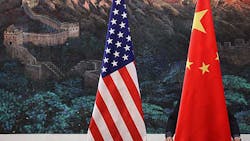Dozens of US Business Groups Warn Trump Against China Tariffs
The U.S. Chamber of Commerce and 44 other associations are urging President Donald Trump not to impose sweeping tariffs in response to China’s trade practices, warning the action would “trigger a chain reaction of negative consequences for the U.S. economy.”
The business groups wrote a letter to Trump on Sunday acknowledging “serious concerns” regarding what they described as China’s theft of trade secrets and other practices and policies, but they urged a measured response that avoided tariffs. The groups represent companies such as Apple Inc., Google and Walmart Inc.
“The Administration should not respond to unfair Chinese practices and policies by imposing tariffs or other measures that will harm U.S. companies, workers, farmers, ranchers, consumers, and investors,” the groups said in the letter.
Trump has announced he would impose tariffs of 25% on steel and 10% on aluminum, with some exclusions and exceptions, to curb cheap imports from China and other countries. The administration is also considering clamping down on Chinese investments in the U.S. and imposing tariffs on a broad range of its imports to punish Beijing for alleged theft of intellectual property, according to people familiar with the matter.
Higher Prices
Sweeping tariffs would provoke retaliation, stifling U.S. exports and raising costs for U.S. businesses and consumers, the groups said in their letter to Trump. They highlighted the potential impact, including higher prices for electronics, apparel and other products, and harming U.S. companies that sell component pieces of final products exported from China.
U.S. manufacturers would face more expensive product components and disrupted supply chains, affecting jobs, the letter said. Manufactured products comprised more than 85% of exported goods from the U.S. in 2017, totaling $1.3 trillion, the trade associations said.
Tariffs that result in reduced consumption of products would also depress financial markets, the groups said. They urged the administration to work with them to find effective, alternative responses to Chinese trade practices.
“Imposition of unilateral tariffs by the Administration would only serve to split the United States from its allies, hinder joint action to effectively address shared challenges, and ensure that foreign companies take the place of markets that American companies, farmers and ranchers must vacate when China retaliates against U.S. tariffs,” the letter said.
By Mark Niquette
About the Author
Bloomberg
Licensed content from Bloomberg, copyright 2016.
